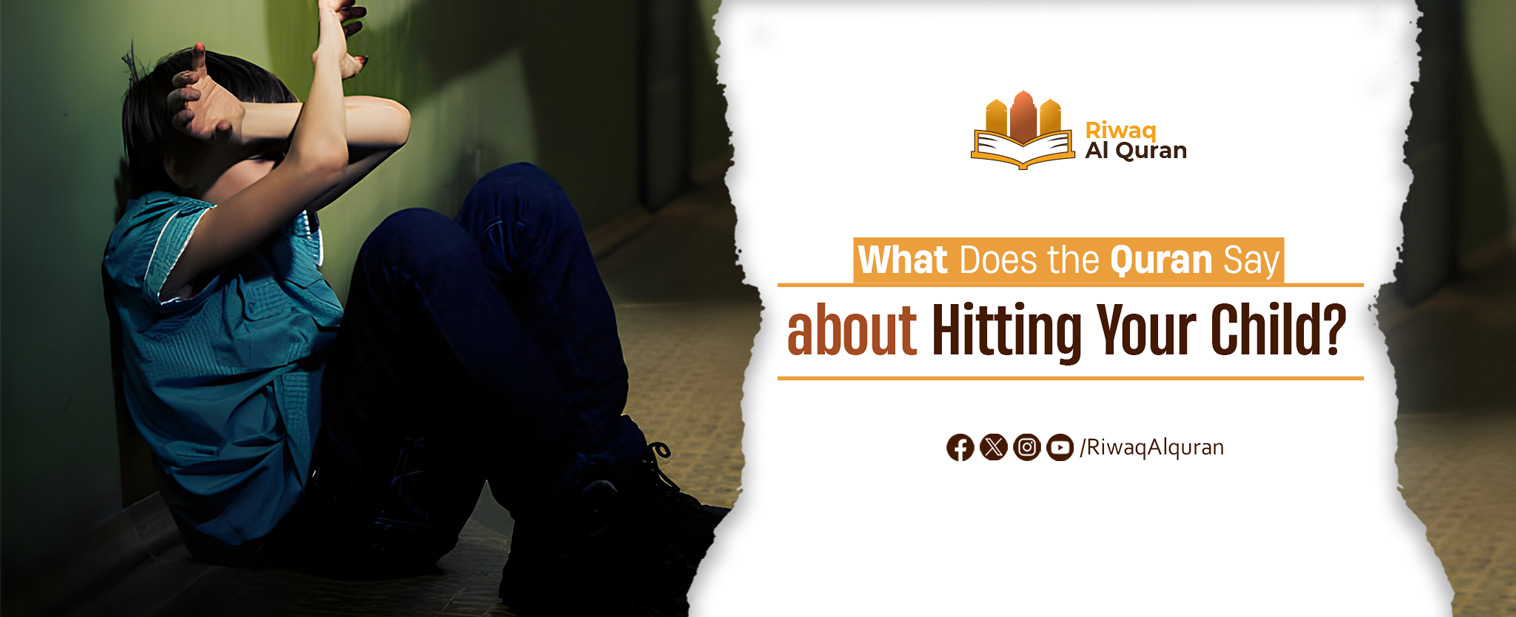In Islam, parenting is deeply rooted in the principles of mercy, compassion, and fairness. While the Quran doesn’t explicitly address physical punishment, Islamic teachings strongly encourage parents to guide their children with love, patience, and positive reinforcement.
Instead of resorting to hitting, parents are urged to discipline in ways that reflect these values, nurturing their children into righteous and God-conscious individuals. Let’s learn more and dive into these concepts together!
Table of Contents
Is Hitting Your Child Haram in Islam?
The question of whether hitting a child is haram Islam is a complex one. While the Quran does not explicitly forbid it, the teachings of the Prophet Muhammad and the overall principles of Islam lean towards discouraging physical punishment as a primary method of discipline.
Islam emphasizes justice, mercy, and compassion. Hitting a child, especially in anger, can lead to physical and emotional harm, which goes against the Islamic principles of protecting and nurturing the well-being of individuals, particularly the vulnerable, like children.
Parents are urged to find alternative methods of discipline that do not involve physical punishment. This could include setting clear rules, using positive reinforcement, and employing time-outs or other non-physical consequences. The goal of discipline in Islam is to guide the child towards good behavior and moral development, not to cause harm or instill fear.
Hadith About Hitting Children
The Hadiths, sayings, and actions of our Prophet provide further insight into the issue of hitting children. The Prophet Muhammad (peace be upon him) is known for his gentle and kind approach to children. He never hit a child and discouraged harsh treatment.
One of the hadiths often cited in discussions about discipline is:
“When one of you becomes angry, let him remain silent.”
This hadith highlights the importance of controlling anger, which is often the root cause of physical punishment. Instead of reacting in anger, parents are encouraged to calm down and address the situation with a clear mind.
Another relevant hadith that emphasizes the importance of self-control, particularly when dealing with children, is:
“The strong is not the one who overcomes the people by his strength, but the strong is the one who controls himself while in anger.”


How to Discipline a Child in Islam?
Discipline in Islam is not about punishment, but about teaching and guiding children towards the right path. Islamic teachings provide several methods for disciplining children that align with the principles of compassion, fairness, and respect.
1. Leading by Example
One of the most effective ways to discipline a child is by setting a good example. Children learn a great deal by observing their parents’ behavior. If parents demonstrate patience, kindness, and respect, children are likely to adopt these qualities as well.
2. Positive Reinforcement
Islam encourages the use of positive reinforcement to encourage good behavior. Praising a child when they do something right can be more effective than punishing them when they do something wrong. The Prophet Muhammad (peace be upon him) often praised his companions, including children, for their good deeds.
3. Setting Clear Boundaries
Children need to understand what is expected of them. Setting clear rules and boundaries helps children know what is acceptable behavior and what is not. These boundaries should be consistent and reasonable, and parents should explain the reasons behind them.
4. Using Non-Physical Consequences
When a child misbehaves, parents can use non-physical consequences to correct their behavior. This could include time-outs, loss of privileges, or requiring the child to make amends for their actions. The key is to ensure that the consequence is related to the behavior and is fair.
5. Teaching Through Stories
The Quran and Hadiths are rich with stories that teach moral lessons. Parents can use these stories to teach their children about the consequences of good and bad behavior. This method not only imparts moral values but also strengthens the child’s connection to their faith.
6. Encouraging Prayer and Reflection
Encouraging children to pray and reflect on their actions can help them develop self-discipline. Teaching children to ask Allah for guidance and forgiveness can instill a sense of accountability and moral responsibility.
7. Consistent Routines
Establishing consistent routines for daily activities such as prayer, study, and play can help children develop self-discipline. Routines provide structure and help children understand the importance of time management and responsibility.
8. Open Communication
Maintaining open communication with children is essential. Encourage them to express their feelings and thoughts, and listen to their concerns. When children feel heard and understood, they are more likely to respect and follow the guidance given by their parents.
9. Encouraging Empathy
Teaching children to understand and empathize with the feelings of others can prevent misbehavior. When children learn to see things from another person’s perspective, they are less likely to engage in actions that hurt or upset others.
Read more about Duties Of Parents Towards Their Child In Islam: Rights, Treatment, And Responsibilities
Experience Riwaq Al Quran Classes
Watch real moments from our live sessions at Riwaq Al Quran and see how we bring learning to life. These clips highlight our interactive, student-focused approach designed to keep learners engaged, motivated, and actively involved in every step of their educational journey.
Is It Haram to Hit Your Daughter in Islam?
Hitting a daughter, or any child, is generally discouraged in Islam. While it may not be explicitly haram, it is certainly not in line with the teachings of Islam, which emphasize kindness, patience, and gentle guidance. The Prophet Muhammad never hit a child, and his example is one that all Muslims are encouraged to follow.
1. Slapping Daughter in Islam
In many cultures, daughters are treated with less respect than sons, but Islam strongly condemns this behavior. The Prophet Muhammad (peace be upon him) stated:
“He who is involved in bringing up daughters, and he accords benevolent treatment towards them, they will be protection for him against Hellfire.”
This hadith illustrates the high regard Islam places on the treatment of daughters. Slapping or hitting them goes against the principles of mercy and kindness that Islam advocates.
Moreover, the act of hitting can have long-term negative effects on a child, including emotional and psychological harm. Islam teaches that parents should protect their children from harm and nurture them in a safe and loving environment.
2. Status and Treatment of Daughters in Islam
Islam significantly elevated the status of daughters, promoting their value and rights at a time when they were often considered a burden in pre-Islamic Arabia. The Quran and Hadith emphasize treating daughters with love and respect, condemning the practice of female infanticide and advocating for their proper upbringing.
The Prophet’s own actions, particularly his deep affection for his daughter Fatimah set a powerful example. He stressed that daughters, like sons, are blessings from Allah and deserve equal treatment. Islam thus transformed societal attitudes toward daughters, ensuring they were honored and cherished within the family and community.
3. Hadith About Slapping on the Face
Slapping someone on the face, whether a child or an adult, is particularly discouraged in Islam. The face is considered honorable, and hitting it is seen as a form of disrespect. Prophet Muhammad explicitly forbade striking the face:
“Do not hit the face, do not disfigure (anyone).”
This hadith applies to all forms of physical punishment. Striking a child on the face is not only harmful but also goes against the dignity and respect that Islam teaches should be afforded to every individual.
Read more about Dua For Child’s Righteousness, Piousness, Devotion, Steadfastness, And Good Behaviour And Habits
Punishment for Parents in Islam
Islam holds parents accountable for how they treat their children. Parents are not only responsible for providing for their children’s physical needs but also for nurturing their spiritual, emotional, and psychological well-being. Mistreating a child, including through physical punishment, can lead to severe consequences in the Hereafter.
The Quran and Hadiths remind parents that they will be held accountable for their actions on the Day of Judgment. Our Prophet (peace be upon him) warned against the mistreatment of those under one’s care:
“Allah will ask each one who was given the responsibility about what he was given, whether he kept it or lost it.”
This includes the responsibility of raising children. Parents who abuse or mistreat their children are at risk of incurring Allah’s displeasure. On the other hand, those who raise their children with love, care, and respect are promised great rewards in the Hereafter.
Read more about: What Does the Quran Say About Children?


Why Students Love Learning with Riwaq Al Quran
Hear directly from our students about how Riwaq Al Quran Academy has transformed their connection with the Book of Allah. Their experiences reflect the dedication, care, and quality that guide every step of our teaching.
Deepen Your Understanding of Quranic Parenting Principles with Riwaq Al Quran!
Ready to enhance your understanding of Quranic principles on parenting and discipline? At Riwaq Al Quran, we offer comprehensive Quran courses that provide valuable insights into raising children with love, respect, and adherence to Islamic teachings. Enroll today and deepen your knowledge of the Quran to better guide your family in alignment with its profound values.
We offer several courses such as:
- Online courses for kids.
- Online Quran classes for kids and adults.
- Online Arabic courses
- Online Ijazah courses
- Online Islamic Studies courses.
Here are a sample of our set of Quran Courses that will be helpful for you:
- Online Tafseer Course: Delve into Quranic meanings with our insightful online Tafseer course.
- Noorani Qaida Online: Learn Quranic basics efficiently through our Noorani Qaida online program.
- Online Quran Recitation Course: Enhance Quranic recitation skills through our expert-led online course.
- Online Tajweed Classes: Master Tajweed rules for beautiful Quranic recitation in online classes.
- Quran Memorization Online Course: Memorize the Quran effectively with our specialized online memorization course.
- Online Qirat Course: Explore diverse Qirat styles with our comprehensive online Qirat course.
- Online Quran Classes for Kids: Nurture a love for the Quran in kids through interactive online classes.
Conclusion
In conclusion, while the Quran does not explicitly address the issue of hitting children, the overall teachings of Islam advocate for mercy, compassion, and fairness in all aspects of life, including parenting. Physical punishment, particularly hitting or slapping, is generally discouraged, and parents are urged to find alternative methods of discipline that align with Islamic principles.
Islamic teachings emphasize the importance of guiding children with love and patience, setting a good example, and using positive reinforcement. By following these principles, parents can raise their children to be righteous and God-conscious individuals, insha’Allah.


































